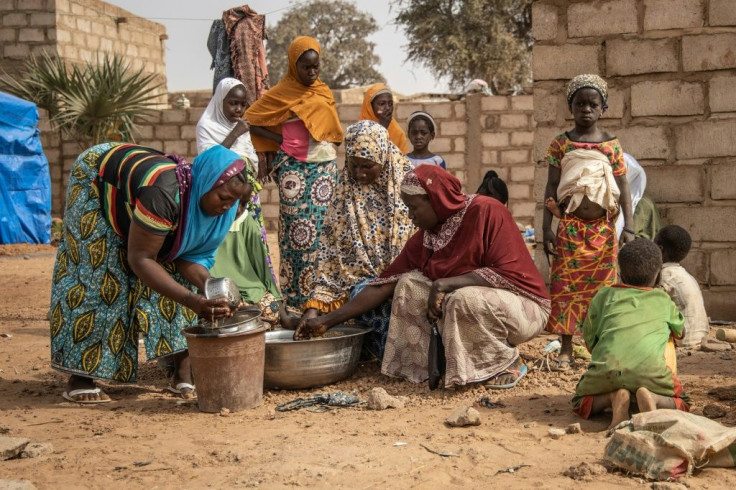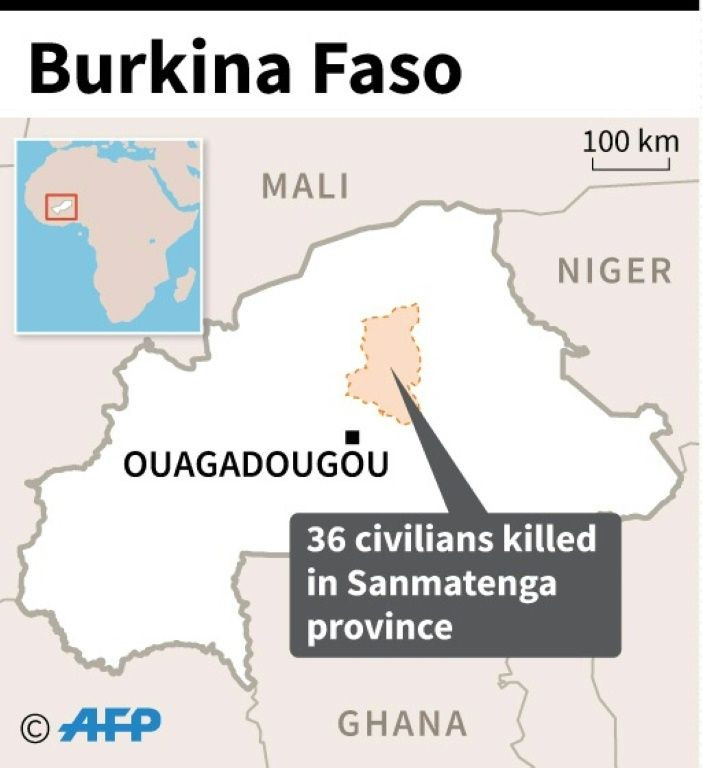Survivors Of Burkina Jihadi Attack Tell Of Terror And Escape

Mechanic Robert Ousseni Sawadogo was tinkering with repairs in his Burkina Faso village when dozens of militants suddenly streamed into the marketplace on motorbikes opening fire on anyone in their path.
Their faces wrapped in turbans, the jihadists split up, cutting off escape routes as villagers fled. Sawadogo managed to escape, but others near him were cut down in Monday's attack that left 36 people dead.
"They rode through the market on motorbikes and they opened fire," Sawadogo said. "They closed down the three entrances to the market. When they attacked, we ran. I managed to escape, but others close to me didn't."
Hundreds of people fled the area in Sanmatenga province, trekking past existing camps for displaced people to reach Kaya, a town about 100 kilometres (60 miles) north of the capital Ouagadougou.
The assault is the latest to target civilians in northern Burkina Faso, where the poorly trained and under-equipped armed forces are struggling against a rising jihadist threat.
Militant attacks have killed more than 750 in Burkina Faso since 2015 when jihadist violence to spill across from neighbouring Mali and spead across the Sahel region. Violence has displaced more than half a million people in Burkina Faso alone.
Survivors of Monday's attack in Nagraogo village described how about 40 militants roared into the marketplace surprising villagers as they sped through the streets.
In Nagraogo, jihadists slaughtered 32 people. They killed four more people in nearby Alamou village as they withdrew.
"They wore turbans and we couldn't see their faces," Sawadogo said in Kaya. "They moved fast, they rode through the market and shot at people. I was lucky to be able to escape."

No group has claimed responsibility for the attack, though the government blamed an "armed terrorist group".
Jihadist violence in Burkina Faso has been blamed on militants linked to both Al-Qaeda and Islamic State affiliated groups.
Attacks appear to be increasingly targeting civilians, analysts say. In December, 35 people, mostly of them women, were killed in a massacre in the northern city of Arbinda.

Market trader Lamine Sebogo, 27, also escaped death in Nagraogo attack, showing where his motorbike helmet was struck by a bullet when he sought to cross the dried-up bed of a stream.
"They stopped me," he said. "There were six of them. I was scared and wanted to turn round but I saw there were others behind me. I had no choice but to ride straight at them. As I passed, I got this bullet in the helmet."
"I warned a vehicle that was coming in the opposite direction and I rode fast to get straight here," Sebogo said from where he found shelter with 16 others in Kaya.
He is used to make trips between Nagraogo and Kaya for business, but he is not sure he wants to go home. He clutched his mobile phone, awaiting news of those who stayed or might still be on the road. But he said he had been told few people were left in his village.
Mechanic Sawadogo also ruled out going back to his village as long as "it hasn't been stabilised" and said he planned to find work in Kaya.
Sawadogo said other villagers said jihadists visited Nagraogo two days before their assault, telling residents to pass a message to the army that jihadists were in the area and they did not fear the military.
"Two days later, they came back, once the.. (army) had already come to the village and headed off somewhere else."
President Roch Marc Christian Kabore declared two days of national mourning to honour victims of the Monday's attack.
Sanmatenga is located south of Soum province on the border with Mali, which has become an epicentre for jihadist activity in West Africa. Many camps for displaced people and refugees are scattered across the province.
Burkina Faso's parliament on Tuesday passed a law to enable the recruitment of local civilian volunteers in the anti-jihadist struggle. After 14 days of military training, the recruits will undertake missions of surveillance, information and protection.
According to the United Nations, jihadist attacks in Mali, Niger and Burkina Faso killed some 4,000 people in 2019 alone.
Burkina Faso is now part of a five-nation Sahel region military cooperation agreement meant to bolster their response to the jihadist insurgency.
© Copyright AFP 2024. All rights reserved.




















